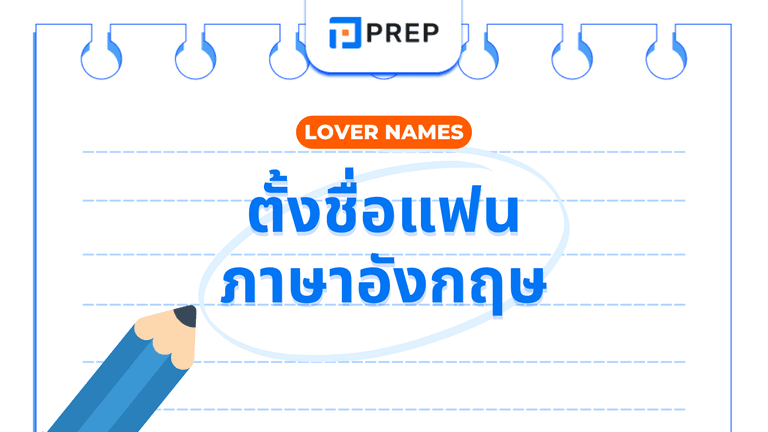แยกประเภทของ Clause ในภาษาอังกฤษให้เข้าใจในไม่กี่นาที
Clause ในภาษาอังกฤษ เป็นหน่วยโครงสร้างพื้นฐานที่สำคัญในการสร้างประโยค ประกอบด้วยประธานและกริยา ซึ่งช่วยให้เราสามารถสื่อสารได้อย่างมีประสิทธิภาพและแสดงความคิดที่ซับซ้อน การเข้าใจ clause ในภาษาอังกฤษ จะช่วยยกระดับทักษะการเขียนและการพูดของคุณให้สูงขึ้นอย่างมาก บทความนี้จะอธิบายอย่างละเอียดเกี่ยวกับ types of clauses พร้อมตัวอย่างและการใช้งานในสถานการณ์จริง

I. Clause ในภาษาอังกฤษคืออะไร
Clause ในภาษาอังกฤษ คือกลุ่มคำที่ประกอบด้วยประธาน (Subject) และกริยา (Verb) อย่างน้อยหนึ่งชุด Clause อาจเป็นประโยคสมบูรณ์หรือเป็นส่วนหนึ่งของประโยคที่ใหญ่ขึ้น
ลักษณะสำคัญของ clause ในภาษาอังกฤษ:
-
มีประธานและกริยาเสมอ
-
แสดงความคิดที่สมบูรณ์หรือไม่สมบูรณ์
-
เป็นหน่วยพื้นฐานของประโยค
-
สามารถรวมกันเป็นประโยคที่ซับซ้อน
1. Clause กับ Sentence ต่าง กัน อย่างไร
ความแตกต่างระหว่าง Clause และ Sentence

|
ลักษณะ |
Clause |
Sentence |
|
ความหมาย |
กลุ่มคำที่มีประธานและกริยา |
ประโยคสมบูรณ์ที่แสดงความคิดครบถ้วน |
|
ความสมบูรณ์ |
อาจสมบูรณ์หรือไม่สมบูรณ์ |
ต้องสมบูรณ์เสมอ |
|
การใช้งาน |
เป็นส่วนหนึ่งของประโยค |
ยืนเป็นประโยคเดี่ยวได้ |
|
ตัวอย่าง |
when I arrive (เมื่อฉันมาถึง - ไม่สมบูรณ์) |
I will call you when I arrive. (ฉันจะโทรหาคุณเมื่อฉันมาถึง - สมบูรณ์) |
2. Phrases and Clauses
Phrases and clauses มีความแตกต่างที่สำคัญ
|
ลักษณะ |
Phrase |
Clause |
|
ประธานและกริยา |
ไม่มี |
มี |
|
การทำหน้าที่ |
เป็นส่วนเสริม |
แกนหลักของประโยค |
|
ตัวอย่าง |
in the morning (ในตอนเช้า) |
when morning comes (เมื่อตอนเช้ามาถึง) |
|
ประเภท |
Noun phrase, Verb phrase, etc. |
Independent, Dependent |
Phrase clause คือ สองหน่วยที่แตกต่างกันโดยสิ้นเชิง โดย Phrase ไม่มีประธานและกริยา แต่ Clause ต้องมีทั้งสองส่วนเสมอ

II. ประเภทของ clause ในภาษาอังกฤษ
1. Independent clause (อนุประโยคอิสระ)
Clause ในภาษาอังกฤษ ประเภทแรกคือ Independent Clause ซึ่งสามารถยืนเป็นประโยคสมบูรณ์ได้เอง
ลักษณะสำคัญ:
- มีความหมายสมบูรณ์
- สามารถเป็นประโยคเดี่ยวได้
- มีประธานและกริยาครบถ้วน
- ไม่จำเป็นต้องมีส่วนอื่นเติมเต็ม
ตัวอย่าง:
- My monitor is intelligent. (มอนิเตอร์ของฉันฉลาดมาก)
- My mom is cooking. (แม่ของฉันกำลังทำอาหาร)
2. Dependent clause (อนุประโยคไม่อิสระ)
Dependent clause ไม่สามารถยืนเป็นประโยคสมบูรณ์ได้เอง ต้องใช้ร่วมกับ Independent Clause
ลักษณะสำคัญ:
- ความหมายไม่สมบูรณ์
- เริ่มด้วยคำเชื่อม (Subordinators)
- ทำหน้าที่ขยายหรือเติมเต็มความหมาย
- ต้องใช้กับ Independent Clause
Types of clauses ของ Dependent Clause:
- Noun Clause (ประโยคนาม)
- Adjective Clause (ประโยคคุณศัพท์)
- Adverb Clause (ประโยควิเศษณ์)

2.1. Noun clause (นามานุประโยค)
Noun Clause ทำหน้าที่เหมือนคำนาม สามารถเป็นประธาน กรรม หรือส่วนเติมเต็ม
คำเชื่อมที่ใช้:
- that, what, whatever
- whether, if
- who, whom, whose, which
- where, when, how, why
ตัวอย่างเช่น:
- The best part of the film was when the boy flew (ส่วนที่ดีที่สุดของภาพยนตร์คือเมื่อเด็กชายบิน). ➞ “The best part of the film” เป็น noun clause (ทำหน้าที่เป็นประธาน)
- I want to know what all the fuss is about (ฉันอยากรู้ว่าทำไมถึงมีเรื่องวุ่นวายขนาดนี้) . ➞“what all the fuss is about” เป็น noun clause (ทำหน้าที่เป็นกรรม)
- Her statement that she found the money in the street will not be believed (คำพูดของเธอที่ว่าเธอเจอเงินบนถนนจะไม่มีใครเชื่อ). ➞“that she found the money in the street” เป็น noun clause (ทำหน้าที่เป็นส่วนขยาย)
2.2. Adjective Clause (ประโยคคุณศัพท์)
Adjective clause ตัวอย่าง แสดงประโยคที่ทำหน้าที่ขยายคำนาม ตามหลังคำนามที่ต้องการขยาย
Relative Pronouns ที่ใช้:
-
who, whom, whose (คน)
-
which, that (สิ่งของ)
-
where (สถานที่)
-
when (เวลา)
-
why (เหตุผล)
2.3. Relative Clause คือ
Relative clause คือ ชื่ออีกชื่อหนึ่งของ Adjective Clause ซึ่งเชื่อมด้วย Relative Pronouns
|
การใช้งาน |
ตัวอย่าง |
|
|
who |
คน (ประธาน) |
The man who lives next door is a teacher. (ผู้ชายที่อยู่บ้านข้างๆ เป็นครู) |
|
which |
สิ่งของ |
The book which is on the table is mine. (หนังสือที่อยู่บนโต๊ะเป็นของฉัน) |
|
that |
คน/สิ่งของ |
The car that I bought is red. (รถที่ฉันซื้อสีแดง) |
|
where |
สถานที่ |
This is the house where I was born. (นี่คือบ้านที่ฉันเกิด) |
2.4. Defining Relative Clause คือ
Defining relative clause คือ Relative Clause ที่ให้ข้อมูลจำเป็น ไม่สามารถตัดออกได้
ลักษณะสำคัญ:
-
ไม่มี comma (,)
-
ข้อมูลจำเป็นต่อความหมาย
-
สามารถใช้ that แทน who/which
ตัวอย่าง:
-
The students who study hard will pass. (นักเรียนที่เรียนหนักจะสอบผ่าน)
-
The book that you lent me was interesting. (หนังสือที่คุณให้ฉันยืมน่าสนใจ)
Non-defining Relative Clause:
-
มี comma (,) คั่น
-
ข้อมูลเสริม ตัดออกได้
-
ไม่ใช้ that
ตัวอย่าง: My brother, who lives in London, is a doctor. (พี่ชายฉัน ซึ่งอยู่ในลอนดอน เป็นหมอ)
2.5. Adverb Clause (ประโยควิเศษณ์)
Adverb clause คืออะไร คือประโยคย่อยที่ทำหน้าที่ขยายกริยา คำคุณศัพท์ หรือคำวิเศษณ์ โดยบอกเวลา สถานที่ เหตุผล วิธีการ เงื่อนไข หรือความขัดแย้ง
Adverb clause คือ อะไร ที่ตอบคำถาม: เมื่อไหร่ ที่ไหน ทำไม อย่างไร และในเงื่อนไขใด
|
ประเภท |
คำเชื่อม |
ตัวอย่าง |
|
Time (เวลา) |
when, while, before, after, since, until |
I'll call you when I arrive. (ฉันจะโทรหาคุณเมื่อฉันมาถึง) |
|
Place (สถานที่) |
where, wherever |
Go where you want. (ไปที่ไหนก็ได้ที่คุณต้องการ) |
|
Reason (เหตุผล) |
because, since, as |
She stayed home because she was sick. (เธออยู่บ้านเพราะเธอป่วย) |
|
Purpose (จุดประสงค์) |
so that, in order that |
He studies hard so that he can pass. (เขาเรียนหนักเพื่อที่เขาจะสอบผ่าน) |
|
Condition (เงื่อนไข) |
if, unless, provided that |
If it rains, we'll stay home. (ถ้าฝนตก เราจะอยู่บ้าน) |
|
Contrast (ความขัดแย้ง) |
although, though, even though |
Although it was cold, we went out. (แม้ว่าอากาศหนาว เราก็ออกไป) |
III. If Clause (ประโยคเงื่อนไข)
If clause คือ ประโยคเงื่อนไข (Conditional Clause) ที่แสดงเงื่อนไขและผลลัพธ์ เป็นประเภทหนึ่งของ Adverb Clause
If clause สรุป มี 4 ประเภทหลัก:
|
ประเภท |
โครงสร้าง |
การใช้งาน |
ตัวอย่าง |
|
Zero Conditional |
If + Present Simple, Present Simple |
ความจริงทั่วไป |
If you heat water, it boils. (ถ้าคุณต้มน้ำ มันจะเดือด) |
|
First Conditional |
If + Present Simple, will + V1 |
เงื่อนไขที่เป็นไปได้ในอนาคต |
If it rains, I will stay home. (ถ้าฝนตก ฉันจะอยู่บ้าน) |
|
Second Conditional |
If + Past Simple, would + V1 |
สมมุติฐานปัจจุบัน |
If I were rich, I would travel. (ถ้าฉันรวย ฉันจะเดินทาง) |
|
Third Conditional |
If + Past Perfect, would have + V3 |
สมมุติฐานอดีต |
If I had studied, I would have passed. (ถ้าฉันเรียน ฉันคงสอบผ่าน) |
การใช้ if clause ในสถานการณ์ต่างๆ:
Zero Conditional (ความจริง):
-
If you mix blue and yellow, you get green. (ถ้าคุณผสมน้ำเงินและเหลือง คุณจะได้สีเขียว)
First Conditional (อนาคตที่เป็นไปได้):
-
If she comes, we will start the meeting. (ถ้าเธอมา เราจะเริ่มประชุม)
Second Conditional (สมมุติฐานปัจจุบัน):
-
If I had more time, I would help you. (ถ้าฉันมีเวลามากกว่านี้ ฉันจะช่วยคุณ)
Third Conditional (สมมุติฐานอดีต):
-
If we had left earlier, we wouldn't have missed the train. (ถ้าเราออกเร็วกว่านี้ เราคงไม่พลาดรถไฟ)
If clause ตัวอย่างประโยค เพิ่มเติม:
-
If I had studied harder, I would have a better job now. (ถ้าฉันเรียนหนัก ตอนนี้ฉันคงมีงานดีกว่านี้)
Unless (ถ้าไม่):
-
Unless you hurry, you'll be late. (ถ้าคุณไม่รีบ คุณจะสาย)
IV. Participle Clauses
Participle clauses คือ ประโยคย่อยที่ใช้ Present Participle (V-ing) หรือ Past Participle (V3) แทนประโยคแบบเต็ม
ประเภทของ Participle Clauses:
-
Present Participle Clauses (V-ing)
-
Past Participle Clauses (V3)
-
Perfect Participle Clauses (Having + V3)
การใช้ Present Participle Clauses ใช้แทนประโยคที่มีความหมายกริยาแบบ Active:
|
ประโยคเต็ม |
Participle Clause |
|
While I was walking to school, I met John. |
Walking to school, I met John. (ขณะเดินไปโรงเรียน ฉันเจอจอห์น) |
|
Because she felt tired, she went to bed early. |
Feeling tired, she went to bed early. (เนื่องจากเหนื่อย เธอไปนอนเร็ว) |
การใช้ Past Participle Clauses
ใช้แทนประโยคที่มีความหมายกริยาแบบ Passive:
|
ประโยคเต็ม |
Participle Clause |
|
The book was written in 1990. It became famous. |
Written in 1990, the book became famous. (เขียนในปี 1990 หนังสือกลายเป็นที่มีชื่อเสียง) |
|
Because it was made of wood, the house burned easily. |
Made of wood, the house burned easily. (ทำจากไม้ บ้านไหม้ง่าย) |
บทความที่แนะนำ:
Contrast clause ในภาษาอังกฤษคืออะไร
โครงสร้าง Concessive clause ในภาษาอังกฤษ
V. แบบฝึกหัด clause ในภาษาอังกฤษและเฉลย
เพื่อให้คุณเข้าใจเกี่ยวกับ independent clause และ dependent clause และแยกแยะ noun clause, adjective clause, adverb clause และ relative clause ออกจากกันได้ ลองดูแบบฝึกหัดนี้ไปพร้อมกับเราเลย!
1. แบบฝึกหัด
แบบฝึกหัดที่ 1: ทำเครื่องหมาย ✅ หากเป็น independent clause และเครื่องหมาย ❌ หากเป็น dependent clause:
|
ข้อ |
Independent clause |
Dependent clause |
| 1. We need to figure out how we can make our customers happy | ||
| 2. I enjoy sitting by the fireplace and reading. | ||
| 3. French fries, which many people like, are not a healthy food. | ||
| 4. The Eiffel Tower is a tourist site which is located in Paris. | ||
| 5. The professor always comes to class fully prepared. |
แบบฝึกหัดที่ 2: พิจารณาว่าอนุประโยคที่ทำตัวหน้านี้เป็น noun clause, adjective clause หรือ adverb clause:
- How she behaved at the wedding was terrible.
- Yoga, which a lot of people practice, is a good form of exercise.
- Now that the people have left the party, we must begin cleaning.
- As soon as he saw her, he knew that she was the one.
- My mom remembers the days when there was no TV.
- I wonder how long he will be.
2. เฉลย
แบบฝึกหัดที่ 1:
|
ข้อ |
Independent clause |
Dependent clause |
| 1. We need to figure out how we can make our customers happy |
|
✅ |
| 2. I enjoy sitting by the fireplace and reading. |
❌ |
|
| 3. French fries, which many people like, are not a healthy food. |
|
✅ |
| 4. The Eiffel Tower is a tourist site which is located in Paris. |
|
✅ |
| 5. The professor always comes to class fully prepared. |
❌ |
|
แบบฝึกหัดที่ 2:
|
Noun clause |
How she behaved at the wedding was terrible. |
|
I wonder how long he will be. |
|
|
Adjective clause |
Yoga, which a lot of people practice, is a good form of exercise. |
|
My mom remembers the days when there was no TV. |
|
|
Adverb clause |
Now that the people have left the party, we must begin cleaning. |
|
As soon as he saw her, he knew that she was the one. |
การเรียนรู้ clause ในภาษาอังกฤษ เป็นทักษะพื้นฐานที่สำคัญมากสำหรับการพัฒนาทักษะภาษาอังกฤษ การเข้าใจประเภทต่างๆ ของ clause และการใช้งานอย่างถูกต้องจะช่วยให้คุณสามารถสร้างประโยคที่ซับซ้อนและแสดงความคิดได้อย่างชัดเจน การฝึกฝนอย่างสม่ำเสมอและการนำไปใช้ในสถานการณ์จริงจะช่วยให้คุณเชี่ยวชาญโครงสร้างเหล่านี้และใช้งานได้อย่างเป็นธรรมชาติ ไม่ว่าจะเป็นในการสนทนา การเขียนเรียงความ หรือการสอบภาษาอังกฤษระดับสูงเช่น IELTS
ยังไม่คุ้นเคยกับโครงสร้างของการสอบ IELTS หรือ TOEIC ใช่ไหม? ความไม่มั่นใจอาจส่งผลต่อคะแนนของคุณได้ แบบ ทดสอบ IELTS และ แบบ ทดสอบ TOEIC ของ PREPEDU จะสร้างสภาพแวดล้อมจำลองที่เหมือนจริง ช่วยให้คุณได้ปรับตัวกับรูปแบบคำถามและการบริหารเวลาก่อนวันสอบจริง
ระบบของเรามีข้อสอบ IELTS และข้อสอบ TOEIC มากกว่า 1,000 ข้อ พร้อมอัปเดตตามเทรนด์ล่าสุด ระบบ AI จะวิเคราะห์จุดผิดพลาดของคุณและเสนอแผนปรับปรุงที่ตรงจุด พร้อมระบบติดตามความก้าวหน้าที่แปลงข้อมูลเป็นตัวเลข ทำให้คุณเห็นพัฒนาการของตัวเองได้ชัดเจน
เริ่มฝึกเลยวันนี้แล้วโชว์ความสามารถของคุณในวันสอบจริง มาสัมผัสประสบการณ์ IELTS practice คำถามฝึก TOEIC จาก PREPEDU กันเลย

สวัสดีค่ะ ฉันชื่อมุก ปัจจุบันดูแลด้านเนื้อหาผลิตภัณฑ์ของ Prep Education ค่ะ
ด้วยประสบการณ์มากกว่า 5 ปีในการเรียน IELTS ออนไลน์ด้วยตนเอง ฉันเข้าใจดีถึงความท้าทายที่ผู้เรียนต้องเผชิญ แล้วก็รู้ว่าอะไรที่มันเวิร์ก
มุกอยากเอาประสบการณ์ตรงนี้มาช่วยแชร์ แล้วก็ซัพพอร์ตเพื่อน ๆ ให้ได้คะแนนที่ดีที่สุดค่ะ
ความคิดเห็น
เนื้อหาแบบพรีเมียม
ดูทั้งหมดบทความที่เกี่ยวข้อง
แผนการเรียนรู้ส่วนบุคคล
อ่านมากที่สุด
ติดต่อ Prep ผ่านโซเชียล
















